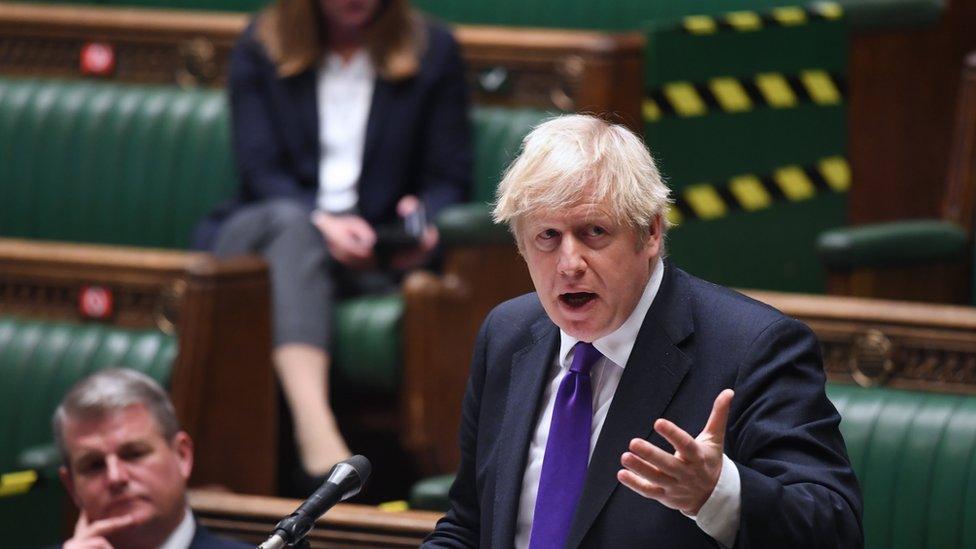The week ahead in Parliament
- Published
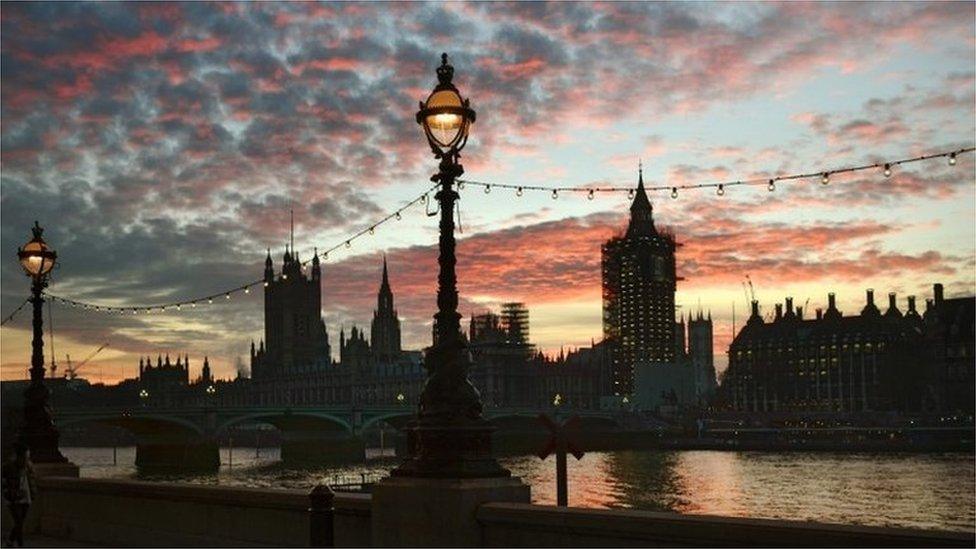
It's an unusually fluid Parliamentary week, as the twin crises over Brexit and Covid loom over the normal humdrum business of Westminster.
The key events will probably be ministerial statements or urgent questions on both subjects, with the possibility of continuing Parliamentary ping-pong over the UK Internal Market Bill (UKIMB) leading to more last-minute rejigging of the published programme for Lords and Commons.
Conversely, a sudden outbreak of agreement could leave both houses with a rather thin agenda, perhaps allowing some of the pent-up backlog of backbench debates to reach the floor of the Commons.
All eyes are on the talks with the EU, both because they matter a great deal and because they could mean a major curtailment of parliamentarians' holiday plans.
There is much speculation about the possibility of sittings continuing up to Christmas Eve, and maybe resuming before the New Year, to approve essential Brexit legislation - including UKIMB and the Trade Bill.
Meanwhile, the first fortnightly review of the Covid restrictions is due on Wednesday and could well result in a ministerial statement or urgent question, so that MPs can ask about the fate of their particular patch.
At the moment the government's internal critics, the Covid Recovery Group, fresh from a 50-string rebellion over the latest tier regulations, seem fairly quiescent.
But they will want ministers to put their thinking on the record, so their actions can be measured against their words, and against criteria like relative infection and death rates, the cost of any new restrictions, in lives as well as money, and the strain on hospitals.
A major flashpoint could be the treatment of London - it would be a huge step to put the capital into Tier 3, but there may be accusations of pro-Southern bias if London is spared, while other cities are not.
There's also a lot of pressure to look at the operation of the restrictions regime over the Christmas holidays, with all kinds of questions about the practicalities around pub and restaurant closing times. A lot of MPs want a full debate.
Here are a few more sub-plots:
Rebel, rebel: Agreement with the EU over the Northern Ireland border may have defused what could have been a destructive confrontation with the Lords over the UKIMB law-breaking clauses, but peers could still dig in their heels over requirements to consult the devolved governments. They remain a thorn in ministerial flesh. Four defeats on the Trade Bill this week and four on UKIMB bring the total of government defeats in the Upper House, since the last election, to 66... and counting. This is the highest total ever recorded, external by the UCL Constitution Unit, which, heroically, keeps track of these things.
Stayin' alive: When the Foreign Office annexed the Department for International Development, the expectation was that the select committee scrutinising it would be abolished - but now the Leader of the House has confirmed that it will keep on going, to the "huge relief" of chair Sarah Champion, who says it will continue "banging the drum for all of the extraordinary benefits of aid and challenge when we see things going wrong".
Succession postponed: One Parliamentary side-effect of the pandemic has been the postponement of by-elections to replace deceased or retired hereditary peers (92 remain in the Upper House). Four vacancies have accumulated, but the Lords Procedure Committee has recommended the freeze continues, although (gasp!) divisions over the issue led to an actual vote.
Here's my rundown of the coming week, bearing in mind the usual health warnings about last-minute changes:
Monday 14 December
The Commons meets (14:30) for an hour of Home Office Questions, with the prospect of ministerial statements or urgent questions to follow from 15:30.
A slot has been set aside to consider Lords amendments to UKIMB, and that will be followed by a general debate on Covid-19.

MPs will share their views on... views
The adjournment debate is on the ominous-sounding subject of "dark skies". Conservative newcomer Andrew Griffith wants tougher planning rules to prevent light pollution, so future generations will still be able to see the stars.
In Westminster Hall (16:30) MPs debate two e-petitions around pay for key workers. The first calls for them to have a 100% tax and National Insurance holiday through Covid-19 crisis, which attracted more than 146,000 signatures. Alongside is one asking for government workers to get "a fair pay rise." This received more than 104,000 signatures and argues that after 10 years of spending cuts, the government should start to restore the real value of their pay with a 10% increase.
That's followed (18:00) by a debate on an e-petition which says that those who refuse a Covid vaccination should not face restrictions on travel or attendance at events.
Committee action includes Public Accounts (14:30) taking evidence from senior officials from the Department of Health and Social Care on Covid-19 protective equipment procurement - over which the chair, Labour's Meg Hillier, clashed with the health secretary in the Commons. Treasury (15:30) takes evidence on the economic impact of coronavirus .
In the Lords (13:00) questions range across the work of the Committee on Climate Change, pilot Environmental Land Management schemes and promoting a green economic recovery after the pandemic.
The main event is consideration of Commons amendments to UKIMB, followed by the Third Reading of the High Speed Rail (West Midlands-Crewe) Bill.
Tuesday 15 December
MPs open (11:30) with Business, Energy and Industrial Strategy Questions.
The day's Ten Minute Rule Bill, from Conservative Richard Holden is the Virginity Testing (Prohibition) Bill, which would ban doctors in England from "testing" whether women have hymens or not. He will argue that young women can still be subjected to this procedure.
Once again, a slot has been prepared for consideration of Lords amendments to UKIMB, after which come the Report Stage and Third Reading of the Taxation (Post Transition Period) Bill. This may see government amendments to reflect any deal agreed with the EU, and veteran Brexiteer Sir Bill Cash, has promised he will attempt to reinstate the "notwithstanding clauses", which would allow ministers to break the law in a "limited and specific way".
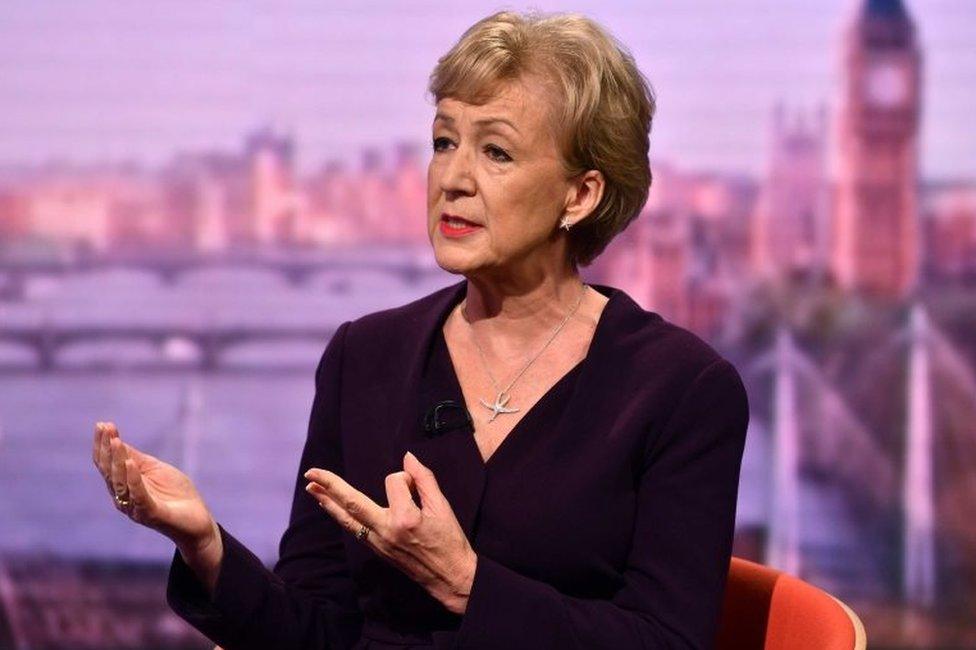
Andrea Leadsom will raise the issue of children's healthcare
In Westminster Hall, former cabinet minister Andrea Leadsom returns to a subject she has championed since entering Parliament, with a debate on healthcare support services for children in the period between conception and age two (09:30).
And Lib Dem Sarah Olney leads a debate on the Planning for the Future White Paper (14:30).
Committee-wise, Health (09:05) has a major evidence session in the wake of the Ockenden review into maternity services at the Shrewsbury and Telford Hospitals, and disparities in maternal deaths. Chair Jeremy Hunt commissioned the review in 2017 when he was health secretary.
Witnesses will include Donna Ockenden and campaigners Clo Abe and Tinuke Awe, who launched a Parliamentary petition calling for action after a 2019 report found that black women in the UK are five times more likely to die during pregnancy and after childbirth than white women. The committee will also quiz academics, midwives, obstetricians and gynaecologists.
Education (10:00) has a pre-appointment hearing with Dame Rachel de Souza, the government's candidate to become Children's Commissioner for England - someone Michael Gove, when education secretary, said he wanted to "clone 23,000 times".
Foreign Affairs (14:30) hears evidence about the Xinjiang detention camps, from Dolkun Isa, president, of the World Uyghur Congress and Professor Fionnuala Ní Aolaín, UN Special Rapporteur on the promotion and protection of human rights and fundamental freedoms.
In the Lords (12:00), questions cover support for freelance arts workers during the pandemic and the Care Quality Commission's Out of Sight - Who Cares? report on community support for autistic people and people with a learning disability.
Then peers turn to the second day of Report Stage consideration of the Trade Bill - and there will also be time for ping-pong on UKIMB, if needed.
Wednesday 16 December
The Commons opens (11:30) with of Wales Questions, before PMQs at 12:00.
The Ten Minute Rule Bill from the SNP's Alyn Smith would give Westminster and the devolved parliaments and assemblies oversight of UK arms exports, and ban the export of autonomous weapons.
Again, there is a slot reserved to debate Lords amendments to UKIMB. Then MPs will debate a series of orders and regulations - on airports slot allocation, tax credits reviews and appeals, and financial services.
In Westminster Hall (09:30) Labour's Dan Jarvis leads a debate on the National Tree Strategy.
In the afternoon, former Westminster City Council Leader Nicki Aiken leads a debate (14:30) on support for the homeless during winter.
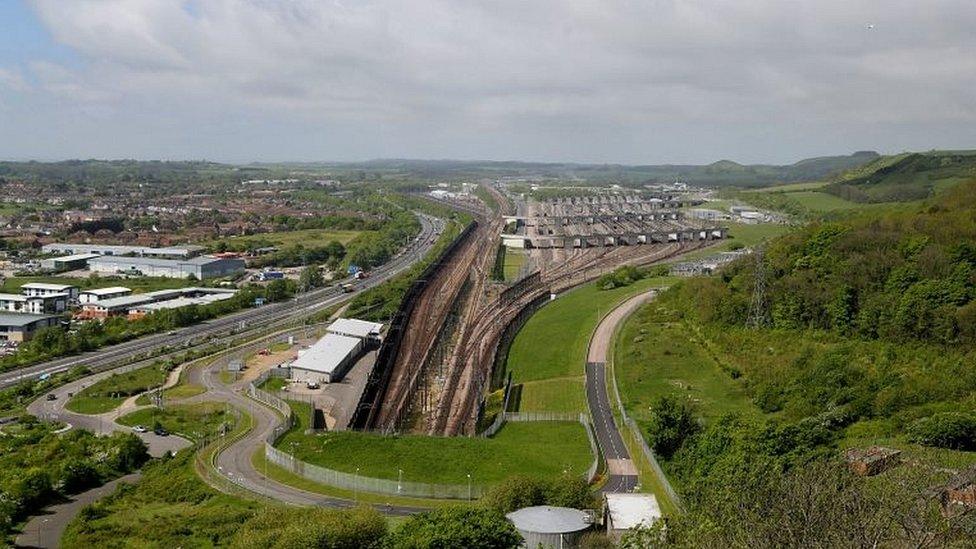
The future of the Channel Tunnel is on the agenda
On the Committee Corridor, European Scrutiny (14:30) looks at the operation of the Channel Tunnel after Brexit with transport minister Rachel Maclean, and Environmental Audit (14:00) continues its inquiry into fashion and sustainability.
In the Lords (12:00) ministers face questions on a National Bus Strategy for England, the number of prisoners and children in custody who have tested positive for Covid, and working with the incoming US government on global priorities, including climate change.
Then peers will deal with all stages of the Taxation (Post-transition Period) Bill in a single gulp - it's a Money Bill, so they're not allowed to amend it in any way.
Thursday 17 December
The Commons opens (09:30) with questions to the Chancellor of the Duchy of Lancaster and Minister for the Cabinet Office (aka Michael Gove), followed by the weekly Commons Business Statement.
Yet again, there is provision for MPs to debate Lords amendments to UKIMB - and the main event will be the traditional end-of-term debate on matters to be raised on the adjournment. This allows MPs to make a speech on any subject they choose, so it is always rather amorphous. But while it is usually the Commons finale before recess, it's quite possible MPs will be back the following week.
Another important nuance is that the debate is scheduled in government time, rather than time allocated by the Backbench Business Committee, which means that it can easily be reallocated to other uses, should the demands of legislating for a deal - or no deal - with the EU require.
In Westminster Hall (13:30) the SNP's David Linden leads a debate on the future of fairs and showgrounds.
Then (15:00) Conservative Alexander Stafford leads a debate to highlight the possibilities of the hydrogen economy. Hydrogen is a promising low-carbon fuel for heavy vehicles and domestic water heating, and the UK could steal a march on its competitors if it develops the technology first.
It's a busy day on the Committer Corridor. Public Accounts (09:15) looks at the Covid-19 free schools meals voucher scheme.
Home Affairs looks at UK-EU security co-operation (10:00) and the Committee on the Future Relationship with the European Union (14:00) hears from Michael Gove and UK chief negotiator Lord Frost about the talks with the EU.
And Digital, Culture, Media and Sport has a session (14:30) on online harm and anti-vaccine misinformation with YouTube, TikTok and Facebook.
In the Lords the day opens (12:00) with the Introduction of Lord Lebedev, the owner of the Evening Standard, The Independent and the TV channel London Live.
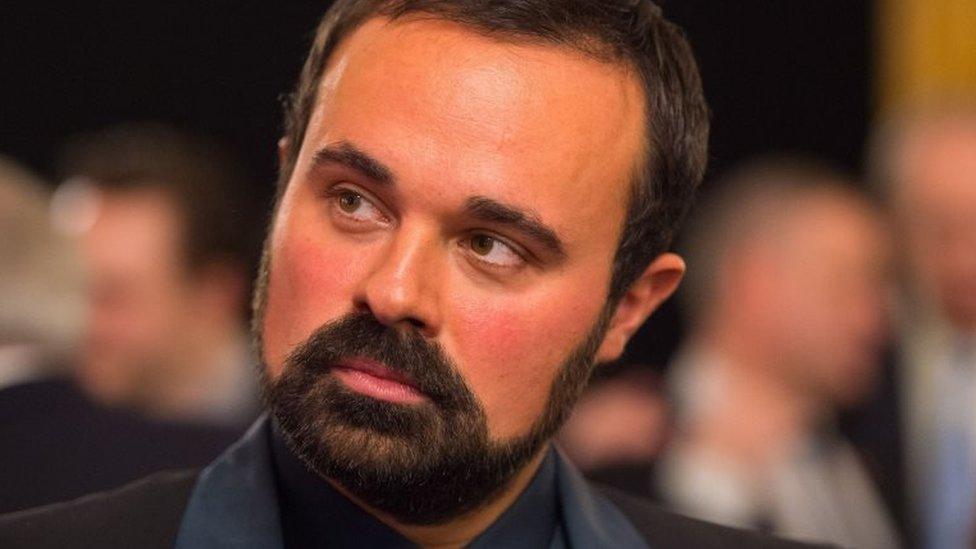
Evgeny Lebedev takes up his peerage
The son of Alexander Lebedev, a Russian banker and former KGB officer, he came to London at the age of eight, when his father began working in the Soviet embassy. He will sit in the Lords as a crossbencher, with the title Baron Lebedev, of Hampton in the London Borough of Richmond upon Thames and of Siberia in the Russian Federation.
Ministers face questions on ensuring delays at ports and airports are avoided, life expectancy statistics, and the role of the UK in safeguarding the rights of the global LGBTI+ community.
And then there's the possibility of another bracing round of ping-pong over UKIMB. They might slot in some other debate as well.
Related topics
- Published30 December 2020

- Published27 November 2020
- Published2 December 2020
